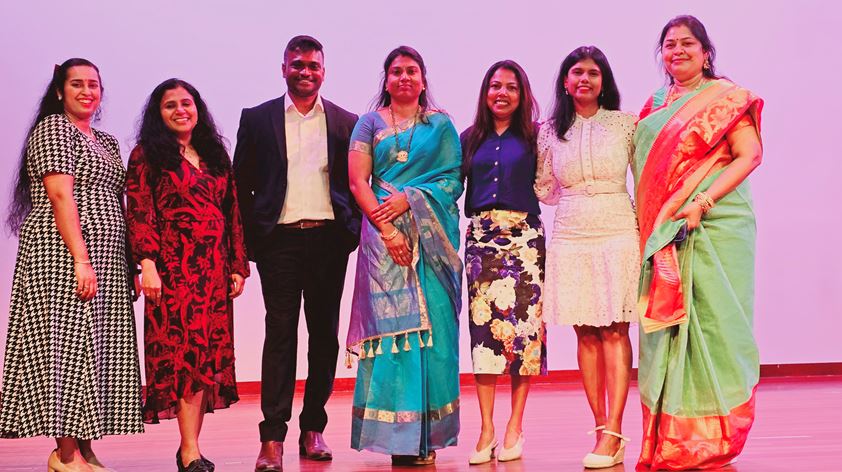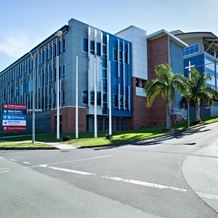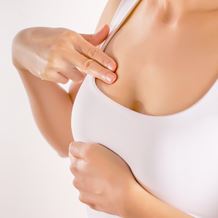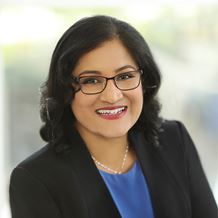Dr Kowsi Murugappan helps launch Femisphere, a women’s health and well-being initiative connecting with Breast Cancer Awareness Month
St Vincent's Private Hospital Northside
October is Breast Cancer Awareness Month and while we assume that knowledge and information is widespread and well understood in the community, that’s not the case across all communities. Leading Breast and Endocrine Surgeon at St Vincent’s Private Hospital Northside, Dr Kowsi Murugappan recently helped launch Femisphere, which focusses on women’s health, welfare and empowerment especially in migrant communities.

Dr Kowsi Murugappan is passionate about women’s health especially in her discipline of women’s breast health.
So it was timely and appropriate that she was invited to be the guest speaker at the recent launch of Femisphere (an initiative of the Tamil Association of Queensland) which has a focus on women’s health and welfare and addressing women's issues as well as creating a supportive and empowering environment that caters specifically to the unique needs and challenges faced by women.
Breast Cancer Awareness Month, provides an opportunity for everyone to focus on breast cancer and its impact on those affected by the disease in our community.
Breast cancer remains the most common cancer among Australian women (excluding non-melanoma skin cancer). However, survival rates continue to improve in Australia with 89 out of every 100 women diagnosed with invasive breast cancer now surviving five or more years beyond diagnosis.
While it’s a simple message, Dr Murugappan says self-care, vigilance and early detection are the keys and it’s well worth reminding women about their importance.

“It’s very much the case that there are different outcomes when breast cancer is detected early.
Early detection equals better survival,” says Dr Murugappan.
“The evidence is out there around the world and I see it day in, day out in my clinic. Women who are picked up with early stage breast cancer, I’m able to provide them with more options for early surgery – often very minimal surgery and possibly other treatments as well.
“So early breast cancer detection does make a big difference to their survival and to their journey through their breast cancer.”
While complacency can sometimes be an issue for some women, there are everyday lifestyle factors for many women.
“It’s not so much as case of, ‘I’m too young to get breast cancer’. The current generation especially of working Mums, it’s more a case of, ‘I’m too busy’,” says Dr Murugappan.
“I know what it’s like – I’m a Mum and juggling family and work commitments and I know it can be very difficult for women who feel like they are time poor. But I can tell you – it’s so important for women to allocate that time for self-care.
“Women need to know that they are number one. Often as women we have competing interests but they need to hear, ‘You are number one, you are worth it’ So put yourself as number one and your family will love that too especially in those cases where there is an early detection of breast cancer.”
It’s the hope that the creation of Femisphere – a sub-committee of the Tamil Association of Queensland - will also allow some tailored messages and information to women in migrant
communities, especially around important women’s health issues such as breast cancer.
“I’m Tamil, I was born in India and my family migrated here when I was 10,” says Dr Murugappan.
“While the Femisphere initiative is inclusive of any women from any migrant population and aims to make them feel empowered and to be part of the community in this great country, the main mission is to generally help to improve the health and welfare of migrant women.”
She says that sometimes in migrant communities (as with the general community) women don’t give themselves permission to put themselves first and to prioritise their health.

“In many Asian communities, there can also be some cultural issues with just focussing on treating the problem after the fact – not looking for the problem early or as an important, and maybe lifesaving, proactive measure,” says Dr Murugappan.
“So often for these women, the approach to things like testing and screening can be in the realm of “Oh, I don’t want to find the problem, it’s too scary.’
“But the key is early detection for breast cancer. It can make a massive difference for how a breast cancer journey unfolds for women and leads to better health outcomes and better survival.
“You don’t want to miss that opportunity – and with early detection, there are so many different treatment options – so it’s nothing to be afraid of. It should be top of your health checklist.”
The Femisphere event launch managed the achievement of gathering the personal attendance and cross-party support of all three levels of government, attended by Senator Paul Scarr (Liberal Party), Queensland Health Minister Shannon Fentiman (Labor Party) and local Brisbane City Council Councillor Emily Kim (Labor).
The new convenor of Femisphere, Preeta Rajendra Singh, says the purpose of the program is to focus on women’s health, welfare, and addressing women's issues and to create a supportive and empowering environment that caters specifically to the unique needs and challenges faced by women.
She says that while they don’t want to restrict the scope or reach of the new movement, there is generally greater disadvantage in migrant communities and sometimes there is less knowledge and understanding – which is why that focus is important.

“The health and well-being of women is the top priority," she says.
"Unfortunately, sometimes in migrant communities some women don’t know their rights or they don’t know what services are available to them and how it can help them with everyday health issues and concerns.
“It’s timely for us to have a focus this month on breast cancer awareness because it’s the most common cancer among Australian women.
“But issues like domestic violence and mental health are very real concerns and everyday issues too, including in CALD (Culturally and Linguistically Diverse) communities and we started this initiative as we know that there is a knowledge and information gap there and women in our communities need to be supported and informed.”
- Home
- Patient News
- Dr Kowsi Murugappan helps launch Femisphere




